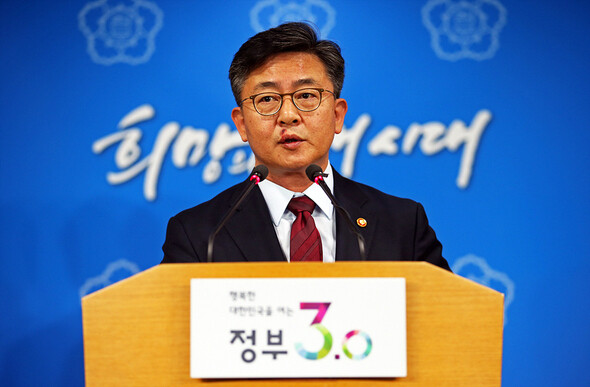hankyoreh
Links to other country sites 다른 나라 사이트 링크
Government denies request to substantiate claims about Kaesong wages

The South Korean government responded to an information disclosure request by saying it was “unable to specifically and accurately confirm” the basis for claims that funds given to North Korea for the recently closed Kaesong Industrial Complex were diverted to development of weapons of mass destruction (WMDs).
Song Gi-ho, an attorney with the group MINBYUN-Lawyers for a Democratic Society, said on Mar. 10 that the Ministry of Unification made the decision not to disclose information in response to the Feb. 23 request for a list of documents confirming the diversion of wages from the complex’s workers to the North’s WMD development.
“It has been determined through various channels that US dollars paid as wages to North Korean workers at the Kaesong Industrial Complex are being relayed to the Workers’ Party leadership for use in nuclear and missile development and ‘legacy projects,’” the ministry explained.
At the same, it declined to provide support, saying it was “unable to specifically and accurate confirm how much was used for nuclear or missile development.”
Unification Minister Hong Yong-pyo previously said on Feb. 14 that “70% of cash from wages to Kaesong Complex workers and other sources is confirmed to have been provided to the party secretariat and used for nuclear weapons or missiles.” The controversy over his claims was fueled further when he told the National Assembly a day later that he “did not mean to say there was evidence.”
The explanation in the ministry’s response is consistent with positions voiced by President Park Geun-hye and Prime Minister Hwang Kyo-ahn since the furor over Hong’s backpedalling.
“We initially requested disclosure of information about the documents‘ forms and titles or a list of them, not the actual documents and their content,” said Song. “Even so, the ministry said it would not disclose them because of ‘concerns that it would markedly harm major national interests related to national security, national defense, unification, and foreign affairs.’”
“The fact that the Ministry of Unification won’t even disclose the names of the documents can only be seen as meaning the administration had no concrete basis for its decision to proceed with a full-scale shutdown of the Kaesong Complex,” Song said.
By Kim Ji-eun and Hyun So-eun, staff reporters
Please direct questions or comments to [english@hani.co.kr]

Editorial・opinion
![[Column] A death blow to Korea’s prosecutor politics [Column] A death blow to Korea’s prosecutor politics](https://flexible.img.hani.co.kr/flexible/normal/500/300/imgdb/original/2024/0415/7517131654952438.jpg) [Column] A death blow to Korea’s prosecutor politics
[Column] A death blow to Korea’s prosecutor politics![[Correspondent’s column] The US and the end of Japanese pacifism [Correspondent’s column] The US and the end of Japanese pacifism](https://flexible.img.hani.co.kr/flexible/normal/500/300/imgdb/original/2024/0412/1017129080945463.jpg) [Correspondent’s column] The US and the end of Japanese pacifism
[Correspondent’s column] The US and the end of Japanese pacifism- [Guest essay] How Korea turned its trainee doctors into monsters
- [Guest essay] As someone who helped forge Seoul-Moscow ties, their status today troubles me
- [Editorial] Koreans sent a loud and clear message to Yoon
- [Column] In Korea’s midterm elections, it’s time for accountability
- [Guest essay] At only 26, I’ve seen 4 wars in my home of Gaza
- [Column] Syngman Rhee’s bloody legacy in Jeju
- [Editorial] Yoon addresses nation, but not problems that plague it
- [Column] Can Yoon and Han stomach humble pie?
Most viewed articles
- 1[News analysis] Watershed augmentation of US-Japan alliance to put Korea’s diplomacy to the test
- 2[Guest essay] How Korea turned its trainee doctors into monsters
- 3[Column] A death blow to Korea’s prosecutor politics
- 4[Photo] Cho Kuk and company march on prosecutors’ office for probe into first lady
- 5[Column] A third war mustn’t be allowed
- 6‘National emergency’: Why Korean voters handed 192 seats to opposition parties
- 7Exchange rate, oil prices, inflation: Can Korea overcome an economic triple whammy?
- 8After Iran’s attack, can the US stop Israel from starting a regional war?
- 9[Editorial] New KBS chief is racing to deliver Yoon a pro-administration network
- 10[Column] Down with the so-called social ladder